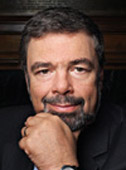Unethical Influence or Healthy Collaboration

Richard Reznick
|
The relationship between surgeons and the pharmaceutical and device industries is
under attack. A plethora of recent controversies surrounding our relationships with
these companies has received front page attention. For several years now there has
been a heightened awareness of approaches to us by these corporations in terms of
invitations to high-end dinners, travel payments, offerings of logo-bearing gifts,
lavish continuing education events, and free samples of drugs and devices. More
concerning has been the advent of more substantial compensation in the form of stock
options and patents; lucrative consulting, speaking and royalty agreements; research
grants; industry-related chairs; and sponsorship of postgraduate medical education
events. And while these interactions have long been an accepted part of practicing
medicine, it seems that over the past few years, there has been a revolution in
how these relationships are viewed.
This seismic shift can largely be attributed to recent publicity of conflicts of
interest, most serious of which was the lengthy US Department of Justice investigation
into the orthopaedic device industry's use of financial kickbacks to surgeons in
the form of "consulting arrangements, trips, and other perks" in exchange for using
their products. Last September, this culminated in settlement agreements with the
five leading makers of artificial joints. Four of the companies - Dupuy Orthopaedics,
Biomet, Smith & Nephew, and Zimmer paid fines of $310 million, while Stryker, the
fifth company, escaped charges as it had been the first to cooperate in the investigation.
Perhaps more far-reaching than the fines, has been the agreement by all five companies
to the appointment of federal monitors to screen every payment made to physicians,
as well as to prominently display detailed lists of compensation made to individual
doctors or medical groups on their web sites.
And while criminal prosecutors have focused their efforts on industry, there are
rumours that the Department of Justice will announce indictment of physicians who
accepted kickback payments from device makers.
Over the last few years there have been many reports that have suggested putting
forth increasingly stringent guidelines governing the interactions with industry.
For instance, the national trade associations for the medical device industry in
the United States and Canada have each developed a voluntary Code of Conduct to
guide ethical business relationships. Academic institutions are also taking steps
to manage their relationships with industry and curb conflicts of interest. Recently,
the AAMC developed a manifesto to curtail the involvement of industry in medical
schools, teaching hospitals, and CME, and urged its members to adopt policies and
procedures related to the guidelines by next summer.1 The essential elements of
the AAMC missive to all medical schools is to:
- Establish and implement policies that
prohibit the acceptance of any gifts from industry by physicians, faculty, students
and residents on- or off-site
- Eliminate the receipt of drug samples
or manage their distribution via a centralized process that ensures timely patient
access throughout the health care system
- Restrict access by pharmaceutical representatives
to individual physicians by confining visits to nonpatient areas and holding them
by appointment only
- Set up a central continuing medical
education (CME)office to receive and coordinate the distribution of industry support
for CME activities
- Strongly discourage participation by
faculty in industry-sponsored speakers' bureaus
- Prohibit physicians, residents, and
students from allowing presentations of any kind to be ghostwritten by industry
representatives.
|
Just this last month Stanford has banned its faculty from accepting any form of
reimbursement from industry, including banning all industry sponsored CME events.2
Closer to home, the Department of Psychiatry at the University of Toronto has created
a lengthy Task Force Report to govern interactions with the pharmaceutical industry.3
It is quite clear that we are at a critical juncture in how we as physicians relate
to industry, and as always there are some who are taking extreme views on the issue.
On one side are those who advocate a draconian approach that would see us cutting
all financial ties to industry. They argue that collaborating with industry affects
our objectivity and even small gifts create a desire to reciprocate.

American Journal of Bioethics 2008
|
In the other camp are those in favour of forging even stronger associations with
industry - essentially holding the belief that "science cannot stop while ethics
catches up". They feel that the more linkages there are between physicians and industry,
the better it is for clinical medicine. They point out that physician-industry interactions
have resulted in many great achievements and are necessary for the advancement of
medical science and the transfer of technology. They worry that a lack of compensation
may make us less willing to help industry with their research, to the ultimate detriment
of patient care.
But really, what would academic medicine look like without industry-physician interactions?
All "unrestricted" educational grants would disappear. Capital donations that support
centers, buildings, and hospital wings would vanish. Collaborations that reward
excellence in the form of industry funded academic chairs would be eliminated. Our
financially strapped health care system which encourages reduced spending and is
already trying to cope with limited resources would suffer, especially in the research
arena. As surgeons, we would relinquish our involvement with industry in the development
of new medical devices and the extensive training required for their adoption. Finally,
our patients might well suffer from the stultification of industry-physician collaboration
in technological innovation.
While there will undoubtedly be further reforms stemming from the investigations
in the U.S., a complete separation of medicine and industry is not the solution.
We need to strike a fine balance - by finding a way to work harmoniously with industry,
while adhering to limits. To do this we need to establish principles which clearly
outline what represents a conflict of interest, and what does not. Moreover, we
must ensure that our interactions with industry take place in an atmosphere of openness
and transparency. It is only through the adoption of such safeguards that we will
be able to maintain our position as a professional, unbiased authority in which
the public can trust, and demonstrate clearly that we, as surgeons, cannot be bought.
Authors Note: I would like to acknowledge the research and writing assistance I
received from Maggie Jugenberg in preparing this commentary. Maggie is an educational
corporate planning specialist at UHN.
-
http://www.aamc.org/newsroom/pressrel/ 2008/080619.htm
- http://med.stanford.edu/coi/siip/policy.html
-
http://www.facmed.utoronto.ca/Assets/ about/pharmaceutical.pdf
Richard K. Reznick
R.S. McLaughlin Professor and Chair
|